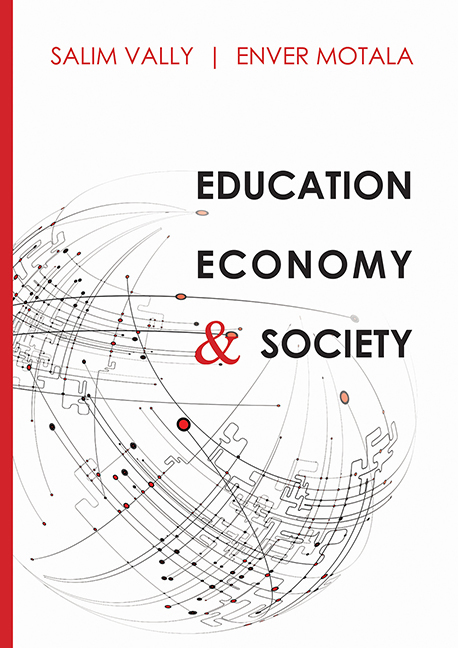Book contents
- Frontmatter
- Contents
- Foreword
- Preface
- About the contributors
- Acknowledgements
- Abbreviations and acronyms
- Chapter 1 ‘NO ONE TO BLAME BUT THEMSELVES’: Rethinking the Relationship between Education, Skills and Employment
- Chapter 2 EDUCATION AND ECONOMY: Demystifying the Skills Discourse
- Chapter 3 UNIVERSITIES AND THE ‘KNOWLEDGE ECONOMY’
- Chapter 4 GOING AROUND IN CIRCLES: Employability, Responsiveness, and the Reform of the College Sector
- Chapter 5 BUILDING A TRANSFORMATIVE PEDAGOGY in Vocational Education
- Chapter 6 SKILLS? WHAT SKILLS? JOBS? WHAT JOBS? An Overview of Research into Education/Labour Market Relationships
- Chapter 7 DEBATING THE NEXUS of Education, Skills and Technology in the Age of Lean Production: A Case Study of the ArcelorMittal Vanderbijlpark Plant
- Chapter 8 SKILLS, JOBS AND DECEPTION: Examples from the South African Workplace
- Chapter 9 ON THE USE AND ABUSE OF EDUCATION: Reflections on Unemployment, the ‘Skills Gap’ and ‘Zombie Economics’
- Chapter 10 THE YOUTH WAGE SUBSIDY in South Africa: Employment, Skills and ‘Churning’
- Chapter 11 EPISTEMIC INJUSTICE and the Struggle for Recognition: Human Dignity and the Recognition of Prior Learning
- Chapter 12 (RE)CLAIMING WORKERS' EDUCATION
- Chapter 13 SKILLS DEVELOPMENT in Post-Apartheid South Africa: Issues, Arguments and Contestations
- Index
Chapter 7 - DEBATING THE NEXUS of Education, Skills and Technology in the Age of Lean Production: A Case Study of the ArcelorMittal Vanderbijlpark Plant
Published online by Cambridge University Press: 16 February 2020
- Frontmatter
- Contents
- Foreword
- Preface
- About the contributors
- Acknowledgements
- Abbreviations and acronyms
- Chapter 1 ‘NO ONE TO BLAME BUT THEMSELVES’: Rethinking the Relationship between Education, Skills and Employment
- Chapter 2 EDUCATION AND ECONOMY: Demystifying the Skills Discourse
- Chapter 3 UNIVERSITIES AND THE ‘KNOWLEDGE ECONOMY’
- Chapter 4 GOING AROUND IN CIRCLES: Employability, Responsiveness, and the Reform of the College Sector
- Chapter 5 BUILDING A TRANSFORMATIVE PEDAGOGY in Vocational Education
- Chapter 6 SKILLS? WHAT SKILLS? JOBS? WHAT JOBS? An Overview of Research into Education/Labour Market Relationships
- Chapter 7 DEBATING THE NEXUS of Education, Skills and Technology in the Age of Lean Production: A Case Study of the ArcelorMittal Vanderbijlpark Plant
- Chapter 8 SKILLS, JOBS AND DECEPTION: Examples from the South African Workplace
- Chapter 9 ON THE USE AND ABUSE OF EDUCATION: Reflections on Unemployment, the ‘Skills Gap’ and ‘Zombie Economics’
- Chapter 10 THE YOUTH WAGE SUBSIDY in South Africa: Employment, Skills and ‘Churning’
- Chapter 11 EPISTEMIC INJUSTICE and the Struggle for Recognition: Human Dignity and the Recognition of Prior Learning
- Chapter 12 (RE)CLAIMING WORKERS' EDUCATION
- Chapter 13 SKILLS DEVELOPMENT in Post-Apartheid South Africa: Issues, Arguments and Contestations
- Index
Summary
Introduction
Faced with global competition, the Iron and Steel Corporation of South Africa (ISCOR), previously a parastatal specifically set up to produce steel for the South African economy under apartheid, employed a strategy of lean production from the late 1980s. The strategy involved technological changes, work reorganisation and privatisation. In 2006, ISCOR came under the ownership of the global steel transnational ArcelorMittal International.
Lean production has the following elements:
• making optimal use of inputs such as raw materials, labour and technology;
• using technology in order to improve the quality of products and reduce waste in the production process;
• producing products based on customer orders and specifications;
• making changes in plant layout to ensure efficient use of space;
• minimising stock-piling of raw materials and products in the plant;
• using computer technology as a tool for managing customer orders, raw materials, labour and the entire production process;
• minimising the defects in products to improve the quality of the products (Barchiesi 1997; Mashilo 2010; Womack et al 1990).
According to Shah and Ward (2007:800):
The main objective of lean production is to eliminate waste by reducing or minimizing variability related to supply, processing time, and demand. Reducing variability related to only one source at a time helps a firm in eliminating only some of the waste from the system; not all waste can be addressed unless firms can attend to each type of variability concomitantly.
Overbeek (2003) locates lean production and technological changes in production within the economic and ideological agenda of capital and neoliberal globalisation, and argues that these strategies undermine the interests of workers and the poor. He argues:
The technological revolution of recent decades has made ‘jobless growth’ the norm rather than the exception. The paper characterises globalisation as a phase of intensified commodification in the global economy, which manifests itself in the globalisation of labour markets (Overbeek 2003: i).
Lean production at ArcelorMittal's Vanderbijlpark plant had negative consequences for the workers. The lean production strategy led to a drastic reduction of the workforce and changes in the nature of the work and skills in the company. This chapter shows that even skilled workers were retrenched as part of the aim of lean production through technological change. The motivation behind these retrenchments was not just lack of skills and low levels of formal education of workers in the plant.
- Type
- Chapter
- Information
- Education, Economy & Society , pp. 125 - 152Publisher: University of South AfricaPrint publication year: 2014

